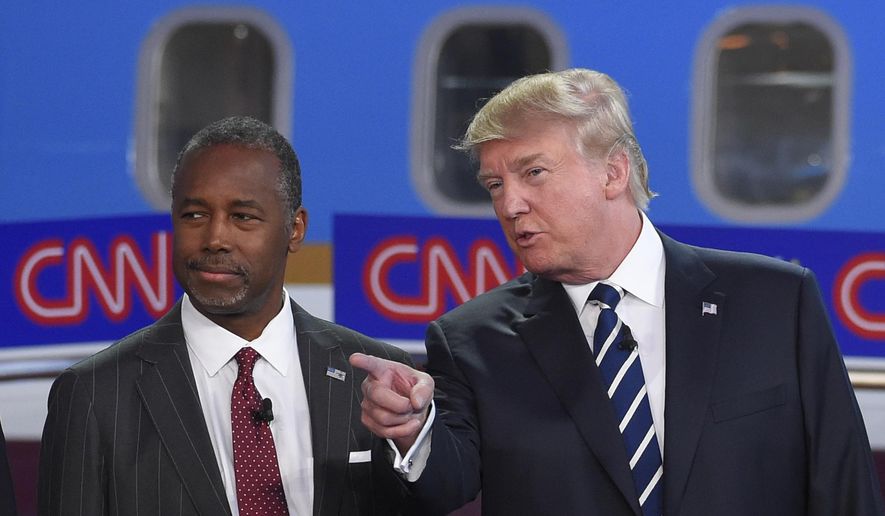Republican presidential candidate Donald Trump has a 9-point lead in the race for the 2016 GOP presidential nomination over retired neurosurgeon Ben Carson, among a potential GOP electorate that now says it prefers new ideas and a different approach over experience and a proven record, according to a poll released Friday.
Mr. Trump was the first choice for 25 percent of potential Republican primary voters in the Pew Research survey, followed by Mr. Carson at 16 percent and Sen. Marco Rubio of Florida and former Hewlett-Packard CEO Carly Fiorina at 8 percent apiece.
Sen. Ted Cruz of Texas was at 6 percent, followed by former Florida Gov. Jeb Bush at 4 percent, and former Arkansas Gov. Mike Huckabee and Sen. Rand Paul of Kentucky at 2 percent apiece. A quarter did not mention a first choice.
Nearly two-thirds of Republican and GOP-leaning voters said it’s more important for a candidate to have new ideas and a different approach, compared to 29 percent who said experience and a proven record was more important.
In March, those numbers were almost flipped, with 57 percent saying experience was more important and 36 percent saying new ideas were more important.
Among those who favored new ideas and a different approach, Mr. Trump was in first at 33 percent, followed by Mr. Carson at 18 percent. Mr. Carson, who has never held elected office before, actually still led among those who preferred experience and a proven record, at 13 percent.
Majorities of Republican voters said they would be more likely to vote for a candidate who wants to end the nuclear agreement with Iran, who wants to end federal funding for Planned Parenthood, and who wants to deploy U.S. ground troops to fight the Islamic State terrorist group.
Forty-three percent said they would be more likely to support a candidate who wants to deport all illegal immigrants in the U.S., as Mr. Trump has called for, while 29 percent said it would make them less likely to support that candidate.
Among those who said such a view on illegal immigration would make them more likely to support a candidate, Mr. Trump was in first at 34 percent, followed by Mr. Carson at 16 percent.
Almost as many potential GOP primary voters said they would be less likely (34 percent) as more likely (31 percent) to support a candidate who wants to raise taxes on wealthy Americans. Mr. Trump’s recent tax plan, though it lowers rates, would also do away with the so-called “carried interest” loophole that allows certain dividends to be taxed at a lower rate.
Among those who said such a position on taxes would make them more likely to support a candidate, Mr. Trump led Mr. Carson, 35 percent to 12 percent.
Forty-one percent of Republican and GOP-leaning voters said they would be more likely to support a candidate who wants to compromise with Democrats, compared to 27 percent who said they would be less likely.
Nearly six in 10 Republicans and GOP-leaning voters (59 percent) said they have an excellent or good impression of their party’s presidential candidates, compared to 49 percent in August 2011 and 50 percent in October 2007.
Republicans are also more engaged this time around, with 81 percent saying they have given a lot or some thought to the 2016 presidential candidates, compared to 74 percent in Sept. 2011 and 69 percent four years before that.
• David Sherfinski can be reached at dsherfinski@washingtontimes.com.




Please read our comment policy before commenting.